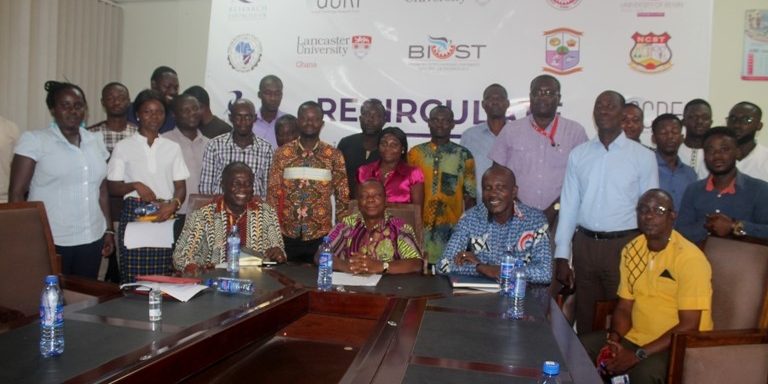RECIRCULATE Encourages Stakeholders to have their say on Water-Efficient Irrigation in Ghana

Researchers and growers working together to co-design research for improved irrigation systems for sustainable food production
For the GCRF-funded RECIRCULATE project, working with stakeholders is central to the success of our research. The overall aim of the project is to help deliver some of the United Nations Sustainable Development Goals (SDGs). We recognise that we can’t do that without working with the individuals or organizations who will be in the front line of translating our research results in to real benefits for their wider communities. The Institute for Industrial Research (IIR) is part of the Council for Scientific and Industrial Research (CSIR), the main science and technology research and development institution of Ghana. One element of CSIR-IIR’s RECIRCULATE research focuses on how to use irrigation water as efficiently as possible by carefully timing the irrigation. This is known as “irrigation scheduling”. As part of this “Water for Food Production” research, we held a knowledge exchange seminar at CSIR-IIR to get the views of practitioners on the commercial potential of irrigation scheduling in Ghana.
The seminar brought together representatives from regulatory institutions such as Water Resource Commission, Agricultural Extension Directorate and Ghana Irrigation Development Authority (GIDA), and Department of Parks and Gardens, as well as fair mix members of farmer-based associations and irrigation system manufacturers and suppliers. Undergraduate and post-graduate students from the University of Cape Coast also attended.
In the first session of the seminar, staff from different CSIR institutes provided overviews of the RECIRCULATE project scientist. Dr William Oduro, the project lead for the project’s “Water for Food Production” research at CSIR-IIR, gave a brief introduction on the water economy. He also shared highlights from our field trials comparing wood ash, inorganic fertilizer and digestate, a product from our “Water for Energy” research, as source of plant nutrients. Dr Kwadwo Ansong Asante from CSIR – Water Research Institute gave a brief overview of the RECIRCULATE’s research in to Water for Sanitation & Health and its links to Water for Food Production. Mr Gilbert Osei of CSIR-IIR spoke on the importance of irrigation scheduling and the various irrigation scheduling technologies. Stakeholders were also briefed on insights from the social research that CSIR-IIR’s RECIRCULATE team has already conducted in Baifikrom and Mankessim of the costal savannah of Ghana. These farmers cultivate various acreage of rice, tomatoes, okra and pepper.
These introductions led to a participatory round table discussion between researchers and stakeholders. There was a consensus amongst the stakeholders that growing food with limited water resources was an urgent need. However, our stakeholders emphasised that the key requirement for meeting this need was that new irrigation scheduling technologies should be affordable and user-friendly for rural farmers, and sustainable in long-term use. They highlighted challenges including the availability of some key scheduling technologies, compounded by limited access to the internet in many rural areas.
The discussion also highlighted that one of the solutions to these challenges was better communication between researchers and those in the community who used their research. This need for better communication was noted from several different perspectives. For example, a representative of the water resource commission identified that one key issue was the gap in the flow of information from researchers to the ‘end-users’ who will ultimately put new technologies in to practice. At the moment, it seemed that research findings that have the capacity to improve livelihood of farmers and conserve water resources were not known by most water users. This was echoed by a representative of the local media, who observed that most local farmers were not much interested in the details of the various scientific procedures used during experiments. Farmers were simply interested in is how to apply the technology to get results. A related question was HOW to improve the flow of information. An extension agent indicated that for farmers to be able to adopt and adequately use irrigation scheduling technologies, extension agents need to be trained, for example through workshops, seminar and demonstration plots, since they are the major source of information for farmers.
In his concluding remarks, Mr Joseph Amoah, the deputy director for CSIR-IIR indicated that CSIR-IIR were glad with the participation of stakeholders in the seminar. He recognised what had been said about the gap between researchers, research findings and stakeholders that are the intended beneficiaries. Mr Amoah further indicated that feedback from the knowledge exchange seminar will inform the design of future research at CSIR-IIR, consistent with RECIRCULATE’s over-arching aim to deliver research that is with, in and for our community.
That commitment to co-designed research informed by stakeholders is part of what CSIR-IIR recognises as an urgent need to find ways to ‘bridge the gap’ between research and research users. This is central to CSIR’s participation in RECIRCULATE. For example, at the project launch in Accra in 2018 the Director General of CSIR, Prof Victor Kwame Agyeman stated that he recognised the accusation that researchers were “not working with stakeholders” but that “RECIRCULATE was designed so that it encompasses all stakeholders”. He went on to note that RECIRCULATE was important for CSIR because it “addresses the need of my institutes, and the need of Ghanaian institutions, in bringing together different stakeholders and building partnerships”. At CSIR-IIR, this informs a range of stakeholder engagement activities within the RECIRCULATE project. That includes our work with local communities in Accra on Water for Sanitation and Health. As well as our activities at CSIR-IRR, our sister institute CSIR Crops Research Institute have held events to discuss irrigation scheduling with growers around Kumasi. Our RECIRCULATE partners in University of Benin have held events with their own stakeholder communities, while partners have worked together to support a programme of workshops and residences that help ‘build bridges; between researchers and a wide range of research users. Of course, we recognise that these are first steps in what may be a long process. That said, we are confident that we are laying a foundation of approaches to knowledge exchange and partnership that will endure throughout the RECIRCULATE project and beyond.
 |
Gilbert Osei is versatile researcher with interest in deficit irrigation, drip irrigation, pitcher irrigation and irrigation water quality. He holds a first degree in General Agriculture and a MPhil degree in Irrigation technology. He is currently working carrying out one of three integrated research projects in RECIRCULATE WP3 – Water for Food Production. He is also a doctoral fellow at the Department of Agricultural Engineering, University of Cape Coast, Ghana pursuing a PhD in Irrigation technology and Management. |
All articles in The FLOW are published under a Creative Commons — Attribution/No derivatives license, for details please read the RECIRCULATE re-publishing guidelines.
